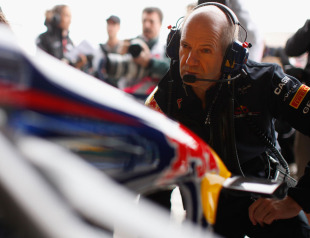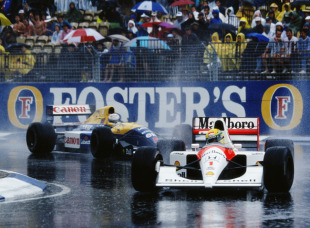
Who has had the most success as a designer in F1? asked Ken Mitchell
The only man to have designed three different makes of car which won the Constructors' Championship is Adrian Newey, currently Red Bull's chief technical officer. Newey, who's now 53, has been with Red Bull since 2006, winning the constructors' crown with them in 2010 and 2011. Previously he designed championship-winning cars for Williams (1992, 1993, 1994, 1996 and 1997) and McLaren (1998), and in all his cars have won over 100 GPs.
Lewis Hamilton has now won the Canadian GP three times. I don't suppose this is a record for one driver winning the same race - but what is? asked James McCormack
Lewis Hamilton has now won three times in Canada, the same as Nelson Piquet. But you're quite right in thinking that this is well short of the record: Michael Schumacher has won the Canadian GP seven times. Turning to all races, the record is eight wins, by Schumacher in the French GP: he also won the San Marino GP seven times, in addition to his seven Canadian successes. Schumacher has also won the Belgian, European, Japanese and Spanish GPs six times; Alain Prost won six in Brazil and France, while Ayrton Senna had a record six triumphs round the streets of Monaco (every year from 1987 to 1993, except '88).
How many other ex-F1 drivers raced at Indianapolis this year, apart from Rubens Barrichello? asked Scott Vanstone
Other than Rubens Barrichello - who ended up in 11th place, and was named Rookie of the Year at 40 - this year's 33-car field for the Indy 500 included four drivers with significant F1 experience. Japan's Takuma Sato, who crashed while dicing for the lead on the final lap at the Brickyard, took part in 92 GPs between 2002 and 2008 for Jordan, BAR and Super Aguri. The Frenchman Sebastien Bourdais (20th) raced for Toro Rosso in 2008 and 2009, while Britain's Justin Wilson (seventh) drove for Minardi and Jaguar in 2003. And another Frenchman, Jean Alesi - who became, at 48, the oldest man to race at Indianapolis for the first time - took part in 201 GPs between 1989 and 2001, winning in Canada in 1995. Sadly, Alesi's Indy 2012 experience was not a happy one: his Lotus was black-flagged after only nine laps for being uncompetitively slow.

The shortest race in the championship record books is the 1991 Australian GP in Adelaide, which was stopped after heavy rain on only the 16th lap out of a scheduled 81: the race was deemed to have finished after 14 laps - little more than 33 miles and about 24½ minutes. Ayrton Senna won the race, but collected only half points for his trouble. The shortest race (in terms of time) that wasn't stopped prematurely by a red flag was the 2003 Italian GP, which was all done and dusted in just over 74 minutes: this was also the fastest-ever GP in terms of the winning speed (Michael Schumacher averaged 153.7mph/247.5kph). And at Monaco in 1978, the winning car - Patrick Depailler's Tyrrell - covered little more than 154 miles (the race was three laps shorter that year than it usually is now).
Sebastian Vettel took pole position in five successive GPs last year. Was this a record? asked Bill Blake
Vettel's five successive pole positions last year - from the Hungarian to the Japanese GPs - equalled his personal best, which was split over the end of 2010 and the start of the 2011 season,. But the overall record is eight successive poles, by the great Ayrton Senna. His run started at the Spanish GP in October 1988, and after two more that season he set the fastest practice lap in the first five events of 1989 too. The sequence came to an end at the Canadian GP in June 1989, when Alain Prost grabbed pole from Senna by seven-hundredths of a second. Senna also managed seven successive pole positions in 1990-91, a feat equalled by Alain Prost (1993) and Michael Schumacher (2000-01).
After Pastor Maldonado's surprise appearance on pole earlier this year, who was the most surprising pole-sitter of all? asked Jeremy Lawson
Races where the practice sessions are disrupted by bad weather often throw up surprise pole-sitters - for example, a drying track in Brazil in 2010 helped Nico Hulkenberg to the only pole of his career to date. Hulkenberg, like Maldonado, was driving a Williams. Other than that arguably the most surprising name I can think of is the Italian Bruno Giacomelli, who had a relatively undistinguished F1 career (one third place from 69 starts) but dominated practice for the 1980 United States GP at Watkins Glen, claiming the first pole for Alfa-Romeo since 1951. Other surprise names at the very front of the grid would include the Welshman Tom Pryce, who led the qualifiers for the 1975 British GP in a Shadow, and another Briton, Mike Parkes, at the 1966 Italian GP. Parkes was largely seen as a sports-car specialist, and this race for Ferrari was only the fourth GP he'd started. But he finished second, as indeed he'd done in his first race earlier that season (this excludes an unsuccessful attempt to qualify for the 1959 British GP).
If you want to ask Steven a question, use our feedback form. The most interesting questions will be answered here every other Friday. His long-running Ask Steven column on Cricinfo remains one of that site's most popular features
© ESPN Sports Media Ltd.
 If you want to ask Steven a question, use our feedback form. The most interesting questions will be answered here every other Friday. His long-running Ask Steven column on Cricinfo remains one of that site's most popular features Ask Steven features a number of experts, headed by Steven Lynch, who answer your questions across Formula One as well as a variety of other sports
If you want to ask Steven a question, use our feedback form. The most interesting questions will be answered here every other Friday. His long-running Ask Steven column on Cricinfo remains one of that site's most popular features Ask Steven features a number of experts, headed by Steven Lynch, who answer your questions across Formula One as well as a variety of other sports

